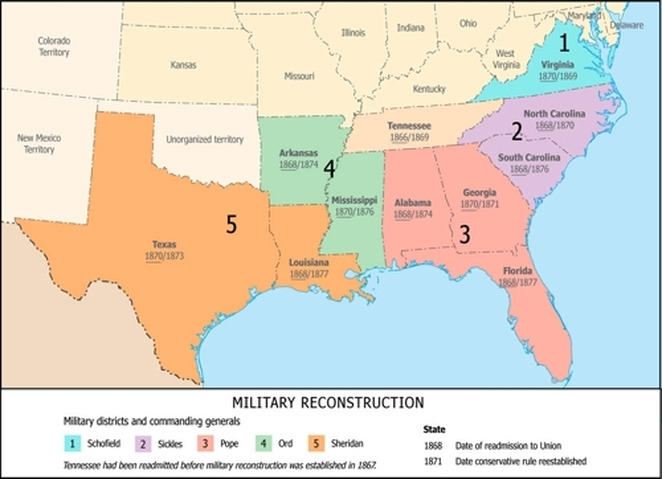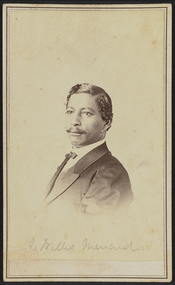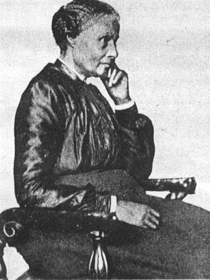Black History
African American History
1866 to 1877
1865-1877 - The Reconstruction era
|
The Reconstruction era, was a period in American history following the American Civil War; it lasted from 1865 to 1877 and marked a significant chapter in the history of civil rights in the United States. Wikipedia
Reconstruction: America After the Civil War - PBSHenry Louis Gates Jr.'s documentary series, Reconstruction: America After the Civil War, explores the transformative years following the American Civil War, when the nation struggled to rebuild itself in the face of profound loss, massive destruction, and revolutionary social change. The twelve years that composed the post-war Reconstruction era (1865-77) witnessed a seismic shift in the meaning and makeup of our democracy, with millions of former slaves and free black people seeking out their rightful place as equal citizens under the law. Though tragically short-lived, this bold democratic experiment was, in the words of W. E. B. Du Bois, a ‘brief moment in the sun’ for African Americans, when they could advance, and achieve, education, exercise their right to vote, and run for and win public office.
PBS Learning Media: Reconstruction: America After the Civil WarVideo Reconstruction: The Black Codes
Video Reconstruction: The 15th Amendment and African American Men in Congress
Video Reconstruction: Ida B. Wells - Pioneer of Civil Rights
Video Reconstruction: The Birth of a Nation - Rewriting History through Propaganda
Reconstruction: The Vote | Black History in Two Minutes (or so)
https://blackhistoryintwominutes.com After the Civil War, the Reconstruction era brought about hope and change in the form of citizenship and equality in America. Black men were given the right to vote, and in 1870, Hiram Revels became the first African American in the U.S. Congress when he was elected to represent Mississippi in the Senate. What followed included more than 2,000 Black office holders serving at every level of America’s political system. Sadly, this progress was short-lived. Black men were denied access to the ballot box and the rights they were granted at the start of the Reconstruction period slowly diminished. In result, a Black presence in Congress was completely eradicated by 1901, and it would take a full generation for it to be restored. In this episode of Black History in Two Minutes or So, we’ll discuss the African-American achievements in the political system that were systematically overturned. Executive Producers: Robert F. Smith Henry Louis Gates Jr. Dyllan McGee
Nov 13, 2009 — This lesson covers two essential aspects of Reconstruction: the condition of the southern states at the close of the war and Lincoln's plan for ...
Reconstruction: The Civil War in Four MinutesJoin Caitlin Verboon of the University of Maryland as she discusses the difficulties that a divided nation faced after the conclusion of the American Civil War and the assassination of Abraham Lincoln. Learn about the Civil Rights Act of 1866, the Fourteenth Amendment, the Fifteenth Amendment, and the Civil Rights Act of 1875, and find out how the era of Reconstruction affected U.S citizens in both the North and the South. Learn More At: https://www.battlefields.org/learn/bi...
Voter fraud, suppression and partisanship: A look at the 1876 electionWith nine days left until Election Day, many Americans hope the race finishes smoothly — unlike the disputed election of 1876. As the United States celebrated the centennial of the Declaration of Independence, a heated competition between Republican Rutherford B. Hayes and Democrat Samuel Tilden was rife with accusations of voter fraud and suppression. Mo Rocca speaks to historians about how the tight race was eventually decided.
The presidential election of 1876 led to the end of Reconstruction. In this election, the Republican Party nominated Rutherford B. Hayes, an Ohioan, while the Democratic Party ran Samuel Tilden, a New Yorker. Tilden won the popular vote by 250,000 votes, but a dispute arose in the Electoral College.
|
PBS: Inside Look | Reconstruction: America After the Civil WarOfficial website: https://to.pbs.org/2U7XbRu | #ReconstructionPBS
See how our past affects our present with this inside look of Reconstruction with Henry Louis Gates, Jr. Reconstruction: America After the Civil War premieres Tuesday, April 9 at 9/8c. CBS Sunday Morning: The story of Reconstruction
n the years following the Civil War known as Reconstruction, newly-freed African American men could finally vote, and would be elected to represent Southerners in Congress. But it was a period that would be transformed into an era of segregation and Jim Crow laws, and be taught to succeeding generations as a failed political experiment. Yet, Reconstruction is now being given its due in school curriculums, and in a new PBS documentary by Harvard professor Henry Louis Gates. Mo Rocca talks with Gates, as well as with historian Eric Foner and author Lawrence Otis Graham, about some of the most noted African American figures in the post-Civil War era.
Reconstruction: The Good, the Bad and the UglyThe period immediately following the Civil War (1865 -1877) is known as Reconstruction. Its promising name belies what turned out to be the greatest missed opportunity in American history. Where did we go wrong? And who was responsible? Renowned American history professor Allen Guelzo has the surprising answers in this eye-opening video. This video was made in partnership with the American Battlefield Trust. Learn more about the Reconstruction at Battlefields.org: http://bit.ly/2NzppkE
The Freedmen's Bureau, formally known as the Bureau of Refugees, Freedmen and Abandoned Lands, was established in 1865 by Congress to help millions of former black slaves and poor whites in the South in the aftermath of the Civil War.
In the years following the Civil War, the Bureau of Refugees, Freedmen, and Abandoned Lands (the Freedmen's Bureau) provided assistance ...
Freedmen's Bureau | Celebrate Black HistoryIn honor of Celebrate Black History Month, presented by Ford Motor Company Fund, take a closer look at objects from the collections of The Henry Ford that help us learn more about life after the Civil War for some of the 4 million newly freed people who worked with the Freedmen’s Bureau to build schools, negotiate legal contracts, and mediate conflict. Freedmen’s Bureau officials encouraged people to deposit their savings in the private Freedman’s Savings and Trust Company. Account holders believed their monies were safe, but the deposits were not guaranteed. Changed lending policies in 1870, the economic panic of 1873, and mismanagement put investments at risk. The bank closed in 1874. Like, share, and subscribe! Check out our blog to learn more about the Freedmen's Bureau: https://www.thehenryford.org/explore/...
The Reconstruction implemented by Congress, which lasted from 1866 to 1877, was aimed at reorganizing the Southern states after the Civil War, providing the ...
|
1866 - Civil Rights Act
|
The Civil Rights Act of 1866 was the first United States federal law to define citizenship and affirm that all citizens are equally protected by the law. It was mainly intended, in the wake of the American Civil War, to protect the civil rights of persons of African descent born in or brought to the United States. Wikipedia
PDF
An Act to protect all Persons in the United States in their Civil April 9, 1866. ... same right, in every State and Territory in the United States, to make their rights. An Act to protect all Persons in the United States in their Civil Rights, and furnish the Means of their Vindication. Be it enacted by the Senate and House of ...
|
The Civil Rights Bill of 1866 proved to be the opening salvo of the showdown between the 39th Congress (1865–1867) and the President over the future of the .
One such law was the Civil Rights Act of 1866, which declared that all people born in the United States were U.S. citizens and had certain inalienable rights, ...
|
September 21, 1866 - 10th Cavalry Regiment of the United States Army formed: Buffalo Soldiers
|
The term Buffalo Soldiers eventually became synonymous with all of the African-American regiments formed in 1866:
Buffalo Soldiers were among the first rangers in what became the National Park Service. Duties would have included protecting against the poaching of wildlife, ...
Buffalo Soldiers: The African Americans Who Won the West | Told by Kevin Frazier | History at Home
Entertainment Tonight host, Kevin Frazier, tells the story of some of America's first Park Rangers, the Buffalo Soldiers. #HISTORYAtHome
Buffalo Soldiers - Service on the Frontier
As the United States moved westward, settlement and expansion hinged on protection by the military. Two African American cavalry regiments, known as the Buffalo Soldiers, were placed in the tense and tenuous position between Native Americans and European settlers. They also worked on infrastructure, like the railroads and telegraph lines that made westward expansion possible. For Buffalo Soldiers, military service offered the opportunity for a better life, and a greater level of independence and respect for their rights not yet widely found in American society.
SHOW LESS Students learn how the Buffalo Soldiers saved Avery, Idaho from destruction by fire and how their accomplishments positively ... Lesson Plan Grades: 3-5, 13+.
|
History Through Hollywood
Buffalo Soldiers (TV Movie 1997)
Fact based story about the all-black US Cavalry Troop H which protected the Western territories in post Civil War times. The story focuses on the troops attempts to capture an Apache ... Director: Charles Haid Stars: Lamont Bentley, Tom Bower, Timothy Busfield "I was a Buffalo Soldier: The Story of Nolan Self" Full Documentary
Nolan Self (1918-2016), a Buffalo soldier who served in the 9th and 10th Cavalry at the turn of WWII recounts his life changing experiences coming into and serving in the military in this biographical documentary. This film is a rare chance to experience what life was like as a Buffalo Soldier during the transitioning years from horse cavalries. Nolan’s journey to the army began when Self’s mother and ten siblings moved from Leesburg, Louisiana, to Pine Bluffs, Arkansas, after his father’s untimely death. Self recounts the trip with about 400 young African-American men on the Missouri-Pacific train from Pine Bluffs to Fort Leavenworth who were to become Buffalo Soldiers. It broke his mother’s heart to think her son was going off to war, but that’s not how Self saw it. “The Army was a salvation to me and my family. I was glad to be a soldier.” Self-explained that the Army moved the 10th Cavalry to Fort Riley to train with the 9th Cavalry. That’s where he met fellow Buffalo Soldier and world heavyweight champion, Joe Louis. Thanks to Louis’s efforts a dance was hosted in Topeka KS where Self would meet his future wife Wilma Self. The couple raised eight sons and the film depicts the deep love, respect and wisdom the two have gained during their seven-plus decades together. We invite teachers everywhere to view and share this great resource of little known American history with their classes. Additional resources will be forthcoming.
PDF
Buffalo Soldier Lesson Plan. Lesson Overview. The grade level for this lesson is K-12 and the subject area is interdisciplinary. The lesson combines social ... PDF
10th Cavalry (National Archives photo). Click on blue links for lessons needed. Buffalo Soldiers Reading and Activities. Interactive PowerPoint Lesson Plans ... |
July 9, 1868 - 14th Amendment to the U.S. Constitution: Civil Rights
|
The Fourteenth Amendment to the United States Constitution was adopted on July 9, 1868, as one of the Reconstruction Amendments. Wikipedia
Constitution of United States of America 1789 (rev. 1992)
Amendment XIV Section 1 All persons born or naturalized in the United States and subject to the jurisdiction thereof, are citizens of the United States and of the State wherein they reside. No State shall make or enforce any law which shall abridge the privileges or immunities of citizens of the United States; nor shall any State deprive any person of life, liberty, or property, without due process of law; nor deny to any person within its jurisdiction the equal protection of the laws. The 14th Amendment of the U.S. Constitution: A HistoryThe Fourteenth Amendment was added to the Constitution in 1868 to empower the federal government -- including particularly federal courts -- to stamp out a culture of lawless tyranny and oppression in the South by enforcing basic civil rights of newly freed blacks and their white supporters. This culture of oppression took many forms, including widespread censorship, the systematic disarmament of freedmen and white unionists, and the wholesale denial of economic liberty. At the heart of the Fourteenth Amendment was the Privileges or Immunities Clause, which the Supreme Court effectively deleted from the Constitution in the 1873 Slaughterhouse Cases. Today, that judicial error continues to take its toll on important freedoms like private property and the right to earn an honest living, which receive virtually no protection from courts despite their obvious importance to ensuring the economic autonomy of the freedmen following the Civil War and all Americans today. http://www.ij.org/cje
|
PDF
Students should have a copy of the 14th Amendment or the 14th Amendment, Section 1 should be on a white board or black board. 2. Ask the students to underline the words that refer to due process:… nor shall any state deprive any person of life, liberty, or property, without due process of law.. The 14th Amendment interpreted against its original meaning [No. 86]
Could an Originalist interpretation of the 14th Amendment have prevented egregious court decisions? Professor John McGinnis argues that true equality and civil rights for African Americans were intended in the 14th Amendment. In Plessy v. Ferguson and other cases, the Supreme Court chose to ignore the original meaning of the 14th Amendment and thus gave rise to decades of injustice that could have been avoided. Professor John O. McGinnis is the George C. Dix Professor in Constitutional Law at Northwestern University School of Law.
The Meaning of the Fourteenth Amendment. Lesson Plan Grades: 9-12. Collection: The Supreme Court.
The 14th Amendment granted U.S. citizenship to former slaves and contained three new limits on state power: a state shall not violate a citizen's privileges or ...
Teaching the Bill of Rights: The Fourteenth Amendment. Whether you are teaching the desegregation of the south during the civil rights era, the debate over ...
|
1868 - John Willis Menard: First African American Elected Official
|
John Willis Menard was a federal government employee, poet, newspaper publisher and politician born in Kaskaskia, Illinois to parents who were Louisiana Creoles from New Orleans. After moving to New Orleans, on November 3, 1868, Menard was the first black man ever elected to the United States House of Representatives. Wikipedia
Photograph shows a head-and-shoulders portrait of political activist and author John Willis Menard (1838-1893). In 1868 Menard became the first ...
In 1868, John Willis Menard won 64 percent of the vote in a special election in Louisiana. But it didn't matter.
Missing: Michigan | Must include: Michigan John Willis Menard, a college-educated political activist born to free parents of French Creole descent, made his Central American journey as a ...
John Willis Menard, abolitionist, author, journalist and politician, was born in 1838 in Kaskaskia, Illinois, to French Creole parents. He was the ...
John Willis Menard, abolitionist, author, journalist and politician, was born in 1838 in Kaskaskia, Illinois, to French Creole parents. He was the first African ...
|
Image courtesy of Library of Congress Had he prevailed in his contested election appeal in 1869, John Willis Menard of Louisiana would have been the first ...
3rd November 1868: John Willis Menard became the first African-American to be elected to Congress
John Willis Menard was born in 1838 to free people of color in Kaskaskia, Illinois. Educated at an abolitionist school in the small city of Sparta, and later at Iberia College in Ohio, he established himself as a gifted speaker and by 1862 had moved to Washington, D.C. where he wrote for African-American newspapers. While in the capital, Menard debated the idea of colonial settlements for freed slaves with Frederick Douglass. This brought him to the attention of Abraham Lincoln’s Commissioner of Emigration, who appointed him to a clerkship in the Interior Department. Nevertheless, as one of the first African-American clerks in the federal government, Menard faced resentment and criticism from his white colleagues and resigned three months later. In 1865 Menard settled in New Orleans where he established his own newspaper as well as being an inspector of customs and a commissioner of streets. As an active member of the Louisiana Republican Party he became their candidate in 1868’s special election to succeed James Mann, a Democrat who had died in office. Running against Caleb S. Hunt, Menard secured approximately 64 percent of the vote, and on 3 November 1868 became the first African-American person to be elected to the United States Congress. Despite the large margin of defeat, Hunt contested the election and the two men were invited to Washington where Menard became the first African-American man to address Congress. He presented his case in the chamber of the House of Representatives, but after lengthy debate neither candidate secured enough support from Congress and the seat remained vacant.
SHOW LESS |
1868 - Mary Ellen Pleasant
|
Mary Ellen Pleasant was a 19th-century American entrepreneur, financier, real estate magnate and abolitionist. She identified herself as "a capitalist by profession" in the 1890 United States census. Her aim was to earn as much money as she was able to help as many people as she could. Wikipedia
|
Born into slavery, Mary Ellen Pleasant became a Gold Rush-era millionaire, defying conventions of what a black woman could be in the 19th ...
Mother of California Civil Rights Movement Hailed as the mother of civil rights in California, Mary Ellen Pleasant was a self-made millionaire and leading abolitionist during the Gold-Rush era.
Mary Ellen Pleasant (1814-1904) ... Mary Ellen Pleasant was born on Aug. 19, 1814 in Virginia and spent her early years in Nantucket, ...
Mary Ellen Pleasant, an African American woman, came to Nantucket in 1827 as a young bonded servant to “Grandma Hussey.” She worked out her bondage ...
Mary Ellen Pleasant was perhaps the most powerful Black woman in Gold Rush-era San Francisco. Accounts differ on where she was born and ...
|
February 3, 1870 - 15th Amendment to the U.S. Constitution: Voting Rights
|
The Fifteenth Amendment to the United States Constitution prohibits the federal government and each state from denying a citizen the right to vote based on that citizen's "race, color, or previous condition of servitude." It was ratified on February 3, 1870, as the third and last of the Reconstruction Amendments. Wikipedia
Sound Smart: The 15th Amendment | History
Historian Yohuru Williams give a brief rundown of the history of the 15th Amendment, which outlawed votings rights discrimination after the Civil War.
15th Amendment to the U.S. Constitution: Voting Rights (1870) ... Passed by Congress February 26, 1869, and ratified February 3, 1870, the 15th amendment granted African American men the right to vote.
Ratified in 1870, the 15th Amendment granted African American men the right to vote. This guide provides access to digital collections at the ...
What are the Civil War Amendments?
Kristopher White of the American Battlefield Trust details the 13th, 14th and 15th Amendments of the Constitution, also known as the "Civil War Amendments," which granted new freedoms and rights to African Americans across the country after the end of the American Civil War.
|
150th Anniversary of the 15th Amendment | Robert Nusbaum Center of VWU
|
February 25, 1870 - Hiram Revels: First African American Senator
|
Hiram Rhodes Revels was an American politician, minister in the African Methodist Episcopal Church, and a college administrator. Born free in North Carolina, he later lived and worked in Ohio, where he voted before the Civil War. Wikipedia
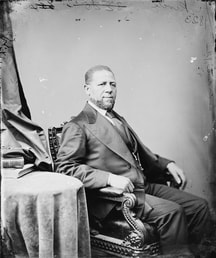
Senator Hiram Revels of Mississippi was the first African American member of the United States Senate. He took the oath of office on February 25, 1870.
Library of Congress A freeman his entire life, Hiram Rhodes Revels was the first African American to serve in the ... in politics, taking his first elected position as a Natchez alderman in 1868. ... of Senators Oliver Morton of Indiana and Zachariah Chandler of Michigan. ... He also edited the Southwestern Christian Advocate newspaper, the official ...
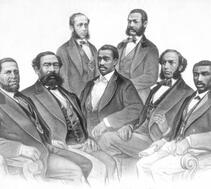
The First Colored Senator and Representatives, Currier & Ives lithography, 1872. Left to right: Senator Hiram Revels (MS), Representatives Benjamin Turner (AL), Robert DeLarge (SC), Josiah Walls (FL), Jefferson Long (GA), Joseph Rainey (SC), and Robert Elliott (SC).
The First Colored Senator and Representatives, Currier & Ives Black Americans in Congress. Since 1870, when Senator Hiram Revels of Mississippi and Representative Joseph Rainey of South Carolina became the first ...
"First Colored Senator and Representatives in the 41st and 42nd Congress of the United States. ... By Currier and Ives, 1872. Courtesy of the Library of Congress. Reconstruction saw the election of an African American senator, Hiram Revels ...
|
Hiram Revels of Mississippi became the first African American senator in 1870. Born in North Carolina in 1827, Revels attended Knox College in Illinois and ...
Did you know this part of Black History?
Voter Fraud is not something new in America, it's sad that we have forgotten this horrible part of Black History.
The First African American Senator; Hiram Revels. ... was the election of African Americans to Congress, including those depicted in this 1872 ...
The First African Americans Elected to Congress
These were the first African Americans elected to office. Many people don't know much about them. Here are a few facts that might surprise you. #History #HistoryWithTim #WallBuilders #Republican #Democrat #AfricanAmericanHistory
In 1868 he gained his first elected position, as alderman for the town of Natchez. The next year he won election to the state senate, as one of 35 ...
|
Jim Crow Segregation Laws
|
Jim Crow laws were state and local laws that enforced racial segregation in the Southern United States and elsewhere within the United States. Wikipedia
Jim Crow laws were state and local statutes that legalized racial segregation. Enacted after the Civil War, the laws denied equal opportunity to ...
Jim Crow laws began in 1877 when the Supreme Court ruled states couldn't prohibit segregation on common modes of transportation. Learn more about Jim ...
Missing: 1871 - | Must include: 1871 - From 1869 to 1871 the goal was to destroy Reconstruction by murduring blacks - and some. The Ku Klux Klan was formed as a social club by a group of ...
PDF
A 1915 health care segregation law prevented white nurses from caring for black male patients. Unlike other former Confederacy states, no laws were enacted ... |
Jim Crow Laws In the South
After the Emancipation Proclamation, blacks fill local and national offices, but white southerners are determined to pass new state laws to curtail this progress.
The segregation and disenfranchisement laws known as "Jim Crow" represented a formal, codified system of racial apartheid that dominated the American ...
THE RISE AND FALL OF JIM CROW explores segregation from the end of the civil war to the dawn of the modern civil rights movement. It was a brutal and ...
|
Civil Rights Act of 1875
|
The Civil Rights Act of 1875, sometimes called the Enforcement Act or the Force Act, was a United States federal law enacted during the Reconstruction era in response to civil rights violations against African Americans. Wikipedia
Radical Republican senator Charles Sumner of Massachusetts introduced the Civil Rights Act in 1870 as an amendment to a general amnesty bill for former ...
In 1883, The United States Supreme Court ruled that the Civil Rights act of 1875, forbidding discrimination in hotels, trains, and other public spaces, was ...
|
The U.S. Supreme Court strikes down the Civil Rights Act of 1875, which makes it a crime for the operators of hotels, theaters, and other public accommodations ...
Civil Rights Acts of 1875 was initially introduced to Congress in 1870 by Massachusetts Senator Charles Sumner and Massachusetts ...
The Civil Rights Act of 1875 ... Image courtesy of Moorland-Spingarn Research Center Before entering Congress in 1873, Representative James Rapier of Alabama ...
|
